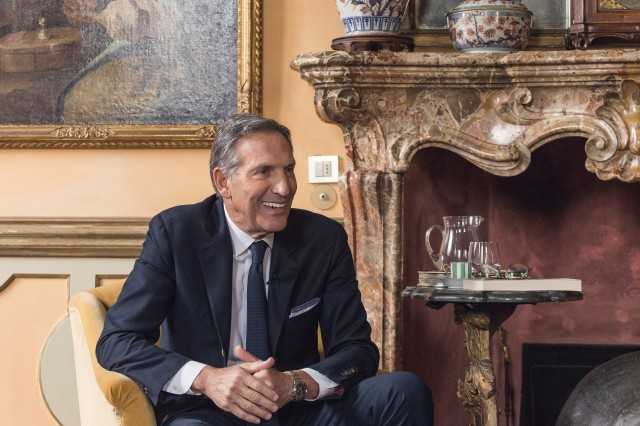By Jena McGregor*
Last August, Starbucks CEO Howard Schultz answered speculation that he wanted to run for president in a New York Times op-ed, writing about how America deserves a “servant leader” and saying that he has “no intention of entering the presidential fray.”
But though that may not have changed, Schultz still offered some presidential-sounding remarks as he closed the company’s annual stockholder meeting Wednesday. At a time when many corporate leaders might be talking about little more than annual results — and in the same meeting when Starbucks’ CEO had to address thornier issues like unpredictable schedules for workers — Schultz spoke in what some called sermon-like fashion about a need for leadership, a lack of civility and the American dream.
“I’ve struggled for weeks to find the right words to express the pain I feel about where America is headed and the cloud hanging over the American people,” Schultz said in seven minutes of closing remarks at the company’s annual meeting. “There are moments when I’ve had a hard time recognizing who we are and who we are becoming. We are facing a test not only of our character but of our morality as a people.”
Schultz did not call out any presidential candidates or elected officials by name, and a spokesperson said in an email that his remarks were not about any particular candidate or agenda and applied to more than just the 2016 presidential race.
Still, the campaign didn’t seem far from his mind. “What is the role and responsibility of all of us as citizens? We must do everything we can to reclaim and reimagine the American dream and fill the reservoir back up — not with cynicism but with optimism, not with despair but with possibility, not with division but with unity,” he said. “It’s not about the choice we make every four years. It’s about the choices we are making every day.”
That sort of lofty rhetoric went on, with Schultz sharing how his mother took him to hear the candidate John F. Kennedy speak when he was a boy growing up in the public housing projects of Brooklyn.
“I’ve always viewed the American dream as a reservoir, and it has constantly been replenished with values, work ethic and the spirit of the American people,” he said. “But sadly, our reservoir is running dry — depleted by cynicism, despair, division, exclusion, fear and yes — indifference.”
Though it may have been an unusual way for a CEO to close a meeting with investors, it was not all that surprising for Schultz. Two years ago at the company’s annual meeting, he talked with investors about the role of public companies “to use our scale for good.” The barista-in-chief has long taken on the CEO-as-statesman role, co-authoring books about veterans and citizenship, asking customers not to bring guns into his stores, calling for a boycott of campaign contributions until politicians could reach a debt solution, and telling an investor who objected to his support for same-sex marriage that he was free to take his money elsewhere.
His company, meanwhile, has often turned to social issues in its campaigns — with decidedly varying results. Back in 2012, amid a debate over fixing the national debt, Starbucks had its baristas write “Come Together” on its customers’ cups. That campaign preceded the ill-fated and ridiculed “Race Together” campaign, which prompted employees to discuss racial issues in the latte line.
Now, Starbucks will echo Schultz’s remarks in a two-page advertisement that it said would run in the New York Times and the Wall Street Journal on Thursday. The ads, in stark black and white, list the opposing ideas Schultz cited in his remarks, followed by comments about the need for unity. A Starbucks logo sits at the end of the ad.
Whatever the ultimate goal of such rhetoric or campaigns — a call for less divisive government, an effort to try and humanize Starbucks’ ubiquitous global brand, the elevation of Schultz’s stature as a conscious capitalist — Schultz embraced those ideals in unreserved fashion during his remarks Wednesday, sounding more like a pastor or a politician than a traditional CEO.
Referring to photos that were shown at the event of Flint, Mich., a homeless veteran and unrest in Baltimore, he recalled Robert Kennedy’s remarks after the assassination of Martin Luther King, Jr.: “We all long for that kind of leadership and those heartfelt words more than any other time in our collective lives.”
He closed it with a story about “my sage rabbi” and a lesson he had taught Schultz. When Jews were being transported to concentration camps during the Holocaust, only a fraction of them had received blankets they had to decide whether to share.
“I ask you today to share your blanket with others, regardless of the color of their skin, regardless of their religion, regardless of their gender, regardless of their sexual orientation, regardless of their station in life or their politics,” Schultz said. “Let’s fill our reservoir back up with the true promise of our country and once again embrace what it means to be Americans.”

















